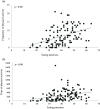Workers' healthy eating practices during the COVID-19 pandemic and their relationship with physical activity and quality of life
- PMID: 39345248
- PMCID: PMC11428102
- DOI: 10.1017/jns.2024.45
Workers' healthy eating practices during the COVID-19 pandemic and their relationship with physical activity and quality of life
Abstract
The lifestyle of the population has undergone significant changes due to the COVID-19 pandemic, which could have influenced alterations in dietary habits and overall well-being among workers. This study aimed to evaluate healthy eating practices and their relationship with the workers' quality of life and physical activity during the COVID-19 pandemic. This was a cross-sectional investigation involving workers in the city of Curitiba, southern Brazil. The study was conducted through the application of an online questionnaire. The data were evaluated using non-parametric tests and fitting a logistic regression model. A total of 123 workers participated in the study, most of them male (53.2%), aged between 31 and 40 years (42.2%), with a predominance of workers with postgraduate degrees (62.6%, n = 77), and the majority of workers (68.2%, n = 84) were performing their professional activities remotely for at least one day during the week, and 73.2% (n = 90). It was observed that 52.8% had excellent healthy eating practices, and the older their age and the greater the practice of physical activity (time and frequency), the better the workers' healthy eating practices. When assessing quality of life, the lowest average score for healthy eating practices was in the domain of social relationships. A direct relationship of older age, social relationships, and the practice of physical activity with the best individuals' healthy eating practices was detected. Considering that remote work continues to be adopted post-pandemic, evaluating the dietary practices, physical activity, and quality of life of workers is necessary to understand this new labour phenomenon.
Keywords: Coronavirus infections; Eating behaviour; Food guides; Health promotion; Nutritional status; Worker’s health.
© The Author(s) 2024.
Conflict of interest statement
The authors declare no conflict of interest.
Figures



Similar articles
-
Did social isolation during the SARS-CoV-2 epidemic have an impact on the lifestyles of citizens?Epidemiol Prev. 2020 Sep-Dec;44(5-6 Suppl 2):353-362. doi: 10.19191/EP20.5-6.S2.137. Epidemiol Prev. 2020. PMID: 33412829 English.
-
Emotional eating, binge eating, physical inactivity, and vespertine chronotype are negative predictors of dietary practices during COVID-19 social isolation: A cross-sectional study.Nutrition. 2021 Oct;90:111223. doi: 10.1016/j.nut.2021.111223. Epub 2021 Mar 9. Nutrition. 2021. PMID: 33934054 Free PMC article.
-
Covid-19 shelter-at-home and work, lifestyle and well-being in desk workers.Occup Med (Lond). 2021 Apr 9;71(2):86-94. doi: 10.1093/occmed/kqab011. Occup Med (Lond). 2021. PMID: 33598681 Free PMC article. Clinical Trial.
-
Nutritional Behavior in European Countries during COVID-19 Pandemic-A Review.Nutrients. 2023 Aug 4;15(15):3451. doi: 10.3390/nu15153451. Nutrients. 2023. PMID: 37571387 Free PMC article. Review.
-
Tools developed in Brazil for the promotion and assessment of adequate and healthy eating habits: A scoping review.Cien Saude Colet. 2023 Nov;28(11):3231-3246. doi: 10.1590/1413-812320232811.17192022. Epub 2023 Mar 1. Cien Saude Colet. 2023. PMID: 37971006 English, Portuguese.
References
-
- World Health Organization. Considerations for Quarantine of Individuals in the Context of Containment for Coronavirus Disease (COVID-19): Interim Guidance, 19 March 2020. Geneva: WHO; 2020.
-
- World Health Organization. WHO Coronavirus Disease (COVID-19) Dashboard. Geneva: WHO; 2020.
-
- Ghasemzadeh-Hoseini E, Keykha E, Omidi A, et al. Oral and maxillofacial stress-related disorders during and after the covid-19 pandemic: a review of the research. Int J Body, Mind Culture. 2023;10(1):10–21.
-
- Pan American Health Organization. Maintaining Essential Services for People Living with Noncommunicable Diseases During COVID-19. Washington, DC: Pan American Health Organization; 2020.

